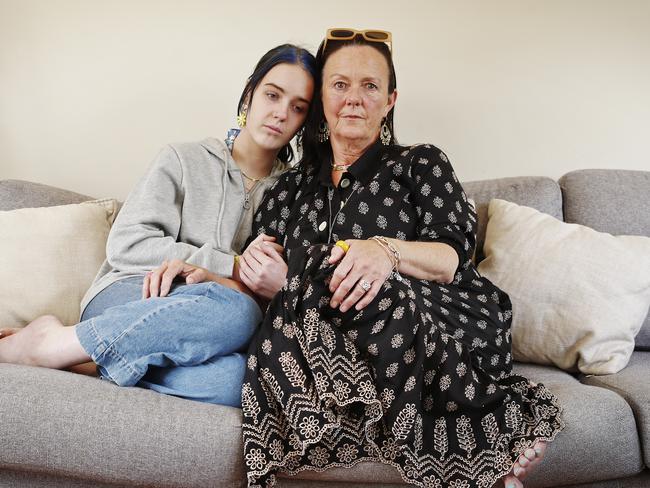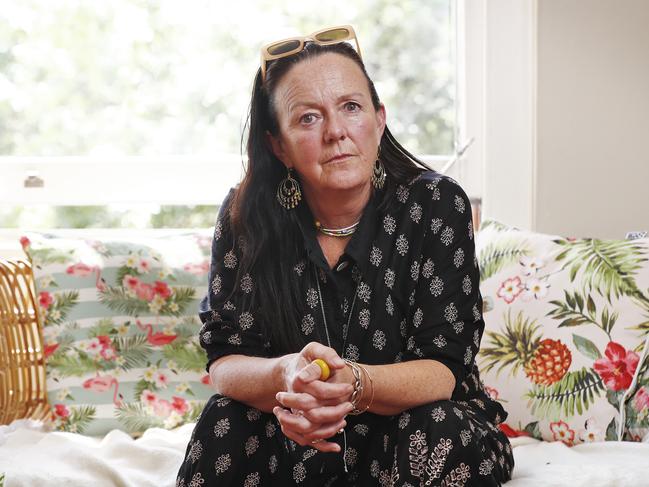Teen’s suicide shatters Sydney family: ‘Lockdown killed Daisy’
Daisy Long lost her travel and study dreams to the pandemic, and then shut herself off from friends and family during lockdown. The 19-year-old took her own life in August, shattering her grieving family.
NSW
Don't miss out on the headlines from NSW. Followed categories will be added to My News.
Every morning Sally Long opens her eyes, rolls over and kisses a picture of her daughter Daisy.
After checking on her youngest child Tiggy, Sally then goes to Daisy’s favourite beach at Freshwater, watches the sunrise and talks to Daisy “in my head”.
She says things like: “I hope you’re peaceful” and: “You know that dad and I are looking after Tiggy.”
Daisy took her life in August amid the second lockdown, when visiting friends was forbidden and all socialising had to be done on a screen.
Now 93 days on from her 19-year-old daughter’s death, Ms Long is left asking why things are not different — and hopes parents will listen to her advice about creative ways to connect with teens and “get them out of their heads”.

“In her goodbye letter to her dad Andy, Tiggy and myself, she talked about her smile and how she ‘was the world’s best actor’,” Ms Long, 57, said.
“To everyone else she was heaven on a stick, she was always smiling.
“But to me she was saying things like: ‘I don’t think I want to be here’, ‘I don’t understand this world and why it’s so cruel’ and: ‘Why is there such disparity in the world?’.”
Daisy had spent her teen years from 13 to 16 suffering the debilitating effects of Lyme disease, a tick-borne illness. In Daisy’s case it affected her ability to walk as well as resulting in severe vomiting, extreme pain, blood pressure fluctuations and lethargy.
For a kid who loved sport, the ocean and her friends so deeply, it was soul-destroying. The illness meant she was unable to attend school.
The medical fraternity’s inability to treat the disease in Australia compounded the family’s grief.
In 2017 Mr Long and Tiggy accompanied 15-year-old Daisy to Cyprus where she had seven weeks of hyperbaric treatment and ozone infusion.
The treatment was successful and she came home free of Lyme infections after her 16th birthday.
“I could go back in time, literally almost the day she got off the plane from Cyprus, I would have had her getting PTSD treatment,” Ms Long said.
“That’s what killed her in the end.”
Daisy completed her HSC via distance education and gained entry into Macquarie University studying psychology.
With so many of her precious teenage years stolen from her, Daisy worked numerous jobs and saved enough to go travel around Europe for six months before spending another six months as a counsellor at a Californian summer camp.

The pandemic meant that 10 days into that trip she had to fly home from London, in March 2020.
“It’s like she only had like a minute to breathe,” Tiggy, 16, said.
“Being her little sister, her and I went from doing things with her every day and then seeing her be sick for so long and barely being able to spend time with her.”
Tiggy said it all changed when they returned.
“After getting back from Cyprus and seeing all her new friends and her going skydiving and scuba diving, I was like: ‘Oh my God, she’s actually getting better’,” Tiggy said.
“It’s like she just had this one moment and then the lockdown brought everything back. It was like she was reliving it, like being at home, stuck being online, not being able to see people.
“She completely pushed everyone away in lockdown as well, which is what she does when she gets in depressive moods.”
Ms Long said Daisy was always smiling but talked to her mother about her PTSD due to Lyme disease and missing her formative teenage years.
In the four months before her August 6 suicide, Ms Long said Daisy had numerous episodes of suicidal ideation.
Daisy was seeing a psychologist once a week and was taking antidepressants.
She had never made an attempt on her own life before and had also developed an eating disorder as a result of the Lyme-induced vomiting.
There was an eight-month waiting list to see an eating disorder specialist.
Tiggy said: “In the first few weeks of her passing, I would go to text Daisy and I would just forget (that she’s died)”.
“She used to come up to me and put the most random filters on my face and then just crack up for hours.
“When me, mum and Daisy lived together in lockdown, Daisy would just make us laugh for hours.
“But, as she said, she was also the world’s best actor.”
Mr Long, 55, said it “breaks my heart every time I have to explain to someone how my daughter died”.
“If she was still here I would try and explain to her that yes, there is a lot wrong with the world, but it is worth hanging around because you can make a difference,” he said.
Ms Long, Mr Long and Tiggy are calling for improved access and funding for mental health care for people of all ages.
They also want Lyme disease to receive more recognition from the medical fraternity and the state and federal government to commit resources to its treatment.
She said if parents are struggling to get through to their teens, give them the option to send a text, email or note.
“The best thing you can do if your child is suffering from any form of mental health issue is just try and get them out of their head,” Ms Long said.
“Teens just being in their head is danger city. Get them talking.
“Try and be creative with the way of communicating with your children to try and draw things out of them.”
Since Daisy’s death, Sally and Tiggy have moved from the property in which she died into an apartment.
Pictures of Daisy are all around and the family can still laugh at the prank videos Daisy made with them.
Ms Long said she used to stop herself laughing but has learned to let go.
She often wears Daisy’s earrings.
“I thought, we can lock ourselves in a room and be really, really, really, really sad,” Ms Long said.
“Or we can embrace Daisy’s life and help each other. We can move through the grief as it happens together, connected, me and Tiggy and Andy and family and friends.
“I hear people say that deceased family members should never be mentioned again. That would just be horrible. Daisy is everywhere.”
The fight to deal with Lyme disease
When Sarah White started suffering the debilitating effects of a Lyme-like disease, she reached out to Daisy Long.
The then 18-year-old knew that Daisy had been suffering from a similar condition, which is caused by tick bite.
The connection gave Miss White hope and understanding, as she swallowed 60 tablets a day, was constantly exhausted and gave away sports and a proper social life.
What made it worse was being a medical outcast.
“It’s just unfair in my eyes, because there are so many people who are sick and are either being told they have mental illnesses and/or are not being treated,” Ms White, from Sydney’s north shore, said.

“And it just doesn’t really make sense to me why there’s so obviously a problem. And if we would just test that problem, then we could be like America, where they treat it within weeks and months and everything’s fine.
“Whereas people in Australia are sick for over seven years and then they’re chronic now and they can’t really get better.”
Daisy had to endure hundreds of medical appointments, with her mother Sally Long saying she spent all her superannuation trying to get her daughter help.
Daisy took her life in August.
In 20-year-old Miss White’s case, her pharmacist mother was able to find her daughter treatment within the first few months of symptoms but added “it’s almost impossible to find treating doctors”.
“And when you do find them, they are booked out and they themselves are questioned by the wider medical profession,” Linleigh White said.
The Department of Health says while there is no current evidence of ticks that transmit Lyme disease in Australia, “the Australian Government acknowledges that there is a group of Australian patients suffering from the symptoms of a chronic debilitating illness which many associate with a tick bite, and has adopted the term Debilitating Symptom Complexes Attributed to Ticks (DSCATT) to refer to suspected tick-borne illness”.
But both families strongly deny there is widespread acknowledgment of Lyme or Lyme-like illness, let alone treatment pathways.

Daisy’s father Andy Long said the PTSD which resulted from physical and mental anguish contributed to her suicide.
“If there was a duty of care from the Australian government there is a good chance that Daisy would still be alive,” Mr Long, 55, said.
“If we had had the proper treatment here — rather than having to go to Cyprus for hyperbaric treatment — perhaps we would have had a better understanding of the collateral mental health impacts of Lyme disease.”
Mrs Long said: “The mental abuse suffered by the patients when they are told ‘it’s all in their head’ or ‘there is nothing wrong with you’ is extremely tortuous to both the parent and the carer”.
Ms White said her latest drug treatment has eased her symptoms, however she lives with the anxiety of another relapse.
“I think that’s my biggest fear is knowing I can’t get help when I need it,” she said.
Got a news tip? Email weekendtele@news.com.au




